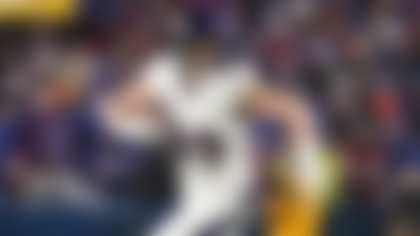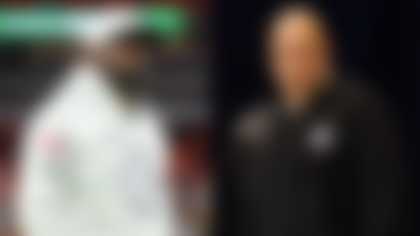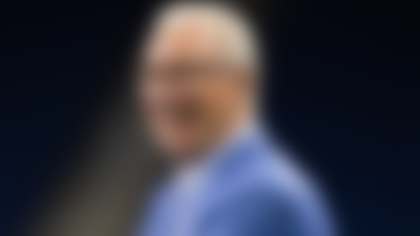Buddy Ryan, the architect of perhaps the greatest defense in NFL history, a doting father to a pair of current-day coaches who carry on his blustery style and legendary curmudgeon beloved by multiple fan bases passed away on Tuesday morning after a lengthy battle with cancer, his agent confirmed to NFL Media.
He was 85 years old, his agent, James Solano said.
Ryan, who created the 46 defense which propelled the Chicago Bears to a dominating victory in Super Bowl XX, was more than just a one hit wonder. His innovation as a blitz-crazed defensive line coach for the New York Jets lifted the team to its only Super Bowl victory in franchise history back in 1969 on the heels of such gems as the "Cheeseburger Blitz" and "Taco Bell Blitz." He was also one of the creative forces behind Minnesota's "Purple People Eaters" defenses back in the mid-1970s.
Oklahoma born and bred, Ryan entered the coaching profession in 1961 with the University of Buffalo following his service in the military. From there, a career as a defensive troubadour began, winding its way through New York, Minnesota, Chicago, Philadelphia, Houston and Arizona.
"Without Buddy Ryan ... I'm just a guy," legendary Bears linebacker Mike Singletary said on an ESPN documentary about the 1985 Bears. "He's someone that you meet, and you think he's the toughest, meanest guy that you'll ever meet. But he loves you. He just doesn't know how to express it. But you know it when he looks at you."
Added Mike Ditka, the head coach of the 1985 Bears, on Tuesday morning: "Buddy was such an integral part of the Chicago Bears and the '85 Bears, it was unbelievable.
"There's no way we win anything without that defense, without his coaching and I think everybody understands that. We won because of our defense, we can never forget that. That's just the way it was."
Ryan turned conventional football wisdom on its head early on in his career. He never understood the coddling of NFL quarterbacks, and famously surmised that "a quarterback has never completed a pass when he was flat on his back." He believed that quarterbacks made too much money, attracted too much attention and acted with an unfair sense of entitlement -- and he spent nearly his entire career torturing them.
Bears chairman George H. McCaskey issued the following sentiment:
"Buddy Ryan was the architect of the greatest defense our league has seen. He was brilliant when it came to the X's and O's of the game, but what made him special was his ability to create an unwavering confidence in the players he coached. From the day he was hired in 1978, his defenses bought into more than the scheme, they bought into him and took on his personality. Buddy was brash, intelligent and tough. He was a perfect match for our city and team, which is why George Halas took the extraordinary step of keeping him at the behest of his defensive players while transitioning to a new coaching staff in 1982. We will always be grateful for Buddy's contribution to the Bears. He is one of the team's all-time greats. Our prayers are with his family."
During the Bears' Super Bowl run in 1985, the team allowed just 12.4 points per game and logged 64 quarterback sacks during the regular season. Defensive end Richard Dent and linebacker Otis Wilson combined for 27.5 alone. In a 46-10 Super Bowl win over New England, Patriots quarterback Steve Grogan was sacked four times and picked off twice. The Patriots rushed the ball 11 times in that Super Bowl for seven total yards.
As former Bears defensive back Doug Plank put it: "We're going to get to know your backup quarterback today."
Ryan is widely believed to be the only coordinator carried off the field during a Super Bowl win.
Opposing coaches struggled to describe the beauty of Ryan's defenses because they could never completely pin it down. Through the late 1970s and early '80s, the varied fronts and organic pressures laid the groundwork for many of the schemes we see today. Dom Capers' psycho front, as well as defenses used by Rex Ryan, Todd Bowles, Romeo Crennel, Bob Sutton and others owe part of their success to the dizzying playbook put together by Buddy Ryan over the years.
Ryan was never afraid of fame and devoured media attention. With the game still in its infancy, Buddy was known as one of the first true quote machines. Some examples:
» "Trade (running back Earnest Jackson) for a six pack; it doesn't even have to be cold."
» "Dumb guys sulk and pout. You never see smart guys pout. Hey, they are paid very well. If they don't do the job, somebody's gotta get on 'em. The good players always react the way they should."
» "Football kickers are like taxi cabs. You can always go out and hire another one."
» "Coaches didn't like it because it made them look bad. We hit a lot of quarterbacks, and that was one of the things coaches were a little tender about."
» "We might have the worst bunch of guys together we've ever seen as a football team. I don't know what anybody else has, but I'd trade mine with anybody, sight unseen."
Ryan's passion for the game often made him a divisive figure. As a coordinator, he warred with his head coach and fellow assistants. During the golden years in Chicago, that meant a famously dysfunctional relationship with Ditka, who by orders from ownership, had to keep Ryan and leave the defense alone. Buddy would hurl erasers at the door when Ditka entered team meetings. When Ditka would suggest Ryan switching to zone late in punishing wins, Ryan would just shrug and walk away. The two had to be separated several times by players during halftime grapples.
"It didn't matter if it was a practice or a game, they were b ------ at each other," quarterback Jim McMahon said in an NFL Films special on the most famous feuds in NFL history. "It's amazing we won."
In Houston, Ryan had a famous disdain for then-offensive coordinator Kevin Gilbride's run-and-shoot offense. Ryan called it the "chuck and duck," amid a public game of cat and mouse that resulted in Ryan throwing a punch at Gilbride on the sideline of a nationally televised game.
That was Ryan -- authentic and ornery until the end. As a head coach in Philadelphia, he presided over some of the most beloved teams in franchise history. He took jabs at ownership, he battled with fans over talk radio and molded a miserable roster into a 43-38-1 team over five seasons. He reached the playoffs three times.
"He was many things to many people -- outstanding coach, mentor, fierce competitor, father figure, faithful friend and the list goes on," Rex Ryan said in a statement. "But to me and my brothers Rob and Jim, he was so much more. He was everything you want in a dad -- tough when he had to be, compassionate when you didn't necessarily expect it, and a loving teacher and confidant who cherished his family. He truly was our hero."
He ended up retiring to his horse farm in Kentucky, but raised a pair of twins -- Rob and Rex -- who both earned Super Bowl rings as assistants. Now, the pair is together in Buffalo, the city where Buddy's coaching career started in earnest.
"Terry and Kim Pegula and the Buffalo Bills organization want to express their deepest sympathies and condolences to Rex, Rob and the entire Ryan family on the passing of their dad, Buddy Ryan," the Bills said in statement. "Buddy was a legend in our league in so many ways."
Rex and Rob are just as authentic and just as ornery. Buddy will undoubtedly live on.











